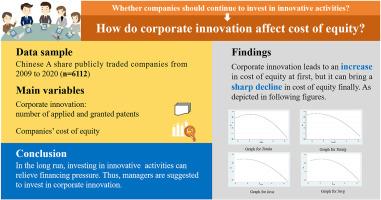Corporate Innovation's Impact on the Cost of Equity: Evidence from China's Listed Companies
IF 10
1区 环境科学与生态学
Q1 ENGINEERING, ENVIRONMENTAL
引用次数: 0
Abstract
In the context of considering the double-edged sword of corporate innovation, this study investigates whether and how corporate innovation affects the cost of equity. Using a patent-based innovation dataset of China's A-share publicly traded companies from 2009 to 2020, the study reveals that corporate innovation is associated with the cost of equity. The results show corporate innovation and the cost of equity have an inverted U-shaped relationship. In the initial stage of innovation, corporate innovation leads to an increase in the cost of equity, exacerbating the problems it brought to the company; but in the middle and late stage of innovation, as the level of innovation increases, the cost of equity experiences a sharp decrease, suggesting that continuing participating in innovative activities can mitigate the problems and even reverse problems into benefits. This study also explores the role of government subsidies as mediator on the association between corporate innovation and the cost of equity. The findings show that subsidies mediate the relationship between corporate innovation and the cost of equity. Innovation can attract more government subsidies and meanwhile, there is an inverted U-shaped relationship between subsidies and the cost of equity. The results provide empirical evidence to encourage managers to invest in innovative activities and also suggestions to policy makers to inject more funds to initial-stage innovative companies to foster innovation development.

企业创新对股权成本的影响:来自中国上市公司的证据
在考虑企业创新这把双刃剑的背景下,本研究考察了企业创新是否以及如何影响股权成本。利用2009 - 2020年中国a股上市公司基于专利的创新数据集,研究发现企业创新与股权成本相关。研究结果表明,企业创新与股权成本呈倒u型关系。在创新的初始阶段,企业创新导致股权成本的增加,加剧了其给企业带来的问题;但在创新的中后期,随着创新水平的提高,股权成本急剧下降,这表明继续参与创新活动可以缓解问题,甚至将问题转化为收益。本文还探讨了政府补贴在企业创新与公平成本之间的中介作用。研究结果表明,补贴在企业创新与股权成本之间起到中介作用。创新可以吸引更多的政府补贴,同时补贴与公平成本之间存在倒u型关系。研究结果为鼓励管理者投入创新活动提供了实证依据,也为政策制定者提供了更多的资金支持,以促进创新发展。
本文章由计算机程序翻译,如有差异,请以英文原文为准。
求助全文
约1分钟内获得全文
求助全文
来源期刊

Journal of Cleaner Production
环境科学-工程:环境
CiteScore
20.40
自引率
9.00%
发文量
4720
审稿时长
111 days
期刊介绍:
The Journal of Cleaner Production is an international, transdisciplinary journal that addresses and discusses theoretical and practical Cleaner Production, Environmental, and Sustainability issues. It aims to help societies become more sustainable by focusing on the concept of 'Cleaner Production', which aims at preventing waste production and increasing efficiencies in energy, water, resources, and human capital use. The journal serves as a platform for corporations, governments, education institutions, regions, and societies to engage in discussions and research related to Cleaner Production, environmental, and sustainability practices.
 求助内容:
求助内容: 应助结果提醒方式:
应助结果提醒方式:


